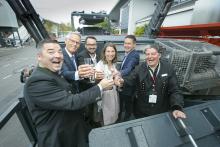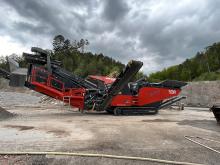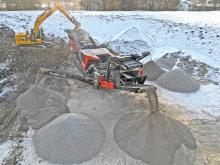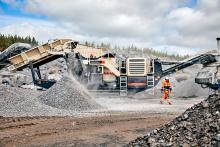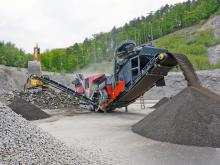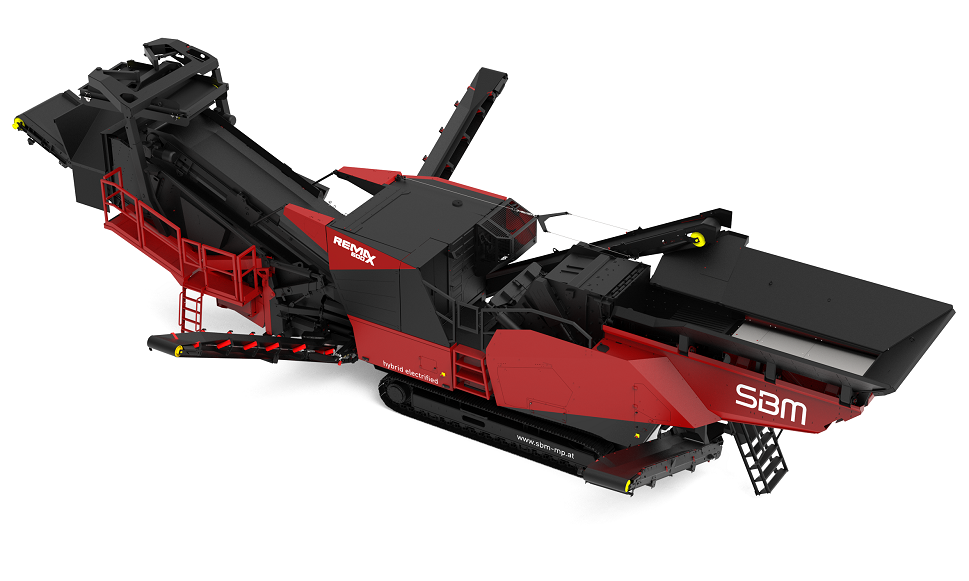
SBM Mineral Processing will present the new track-mobile impact crusher at this year's bauma show in Munich (October 24-30).
With a feed capacity of 600t/h, a 1400-impact crusher for material feed sizes up to 900mm and a maximum total weight of 75 tons depending on the equipment, the plant can provide up to five fractions in one cycle.
Triple wind sifting and the very efficient overbelt magnetic separator with longitudinal discharge as an option – which SBM says is a novel feature in highly mobile impact crushers – ensure the high purity of the final products even in recycling applications.
SBM adds that the new REMAX 600 serves as a technology platform for the fully-automatic production monitoring and control that it is currently developing in co-operation with researchers of the Montanuniversität Leoben, Styria.
Based upon an innovative sensor system and video technology, powerful communication and IT networks, as well as technological innovations such as the automatic gap adjustment, SBM says that artificial intelligence finds its way into mobile processing technique for the very first time.
It adds that the 'autonomous crusher' will help users and operators with all decisions, permanently support efficient operation, assure optimum product quality at all times, as well as make an important contribution to save energy and costs during crushing.
The autonomous crushing R&D project has been running for two years and features interdisciplinary teams from the Leoben Chair of Mineral Processing and SBM research departments. The project aims to make the decisive step from today‘s already extensively monitored and optimised crushing to autonomous fully-automated production by means of “intelligent” self-learning mobile crushers.
In the already well-advanced project, the machine independently assesses feed material and final products via sensors and camera systems, registers better than before the load conditions of crusher and conveyor equipment, and optimises all separation processes down to overbelt magnetic separators and wind sifters.
The SBM control system Crush Control validates all operating conditions and material properties in real-time and sends the values to the SBM headquarters via cloud. A “digital twin” compiled there matches the real machine data with thousands of stored reference data coming from 1:1 quality testing, laboratory tests and computer simulations (rock properties, grain-size distribution curves, particle shapes, etc.).
The optimisation potentials determined from this are sent back to the machine control system, and this allows for immediate and permanent adaptation of all process steps on site without any stoppages.
According to SBM, autonomous crushing will considerably support and relieve users and operators: Based upon specific data the plant can be configured to exactly meet the requirements by selecting the right screening equipment before the plant is relocated or the feed materials are changed.
By means of an interactive menu control even inexperienced operators can precisely adjust the production process – depending on whether maximum output, minimum fuel consumption (eco mode) or quantity-optimised production of certain valuable grain sizes are required .
SBM says the newly integrated tool monitoring in the impact crusher is another benefit as it counteracts shortfalls in quality due to wear during production, and also provides key support for preventive maintenance.
It adds that all system components for the REMAX 600 impact crusher will be optimised under practical conditions large-scale test runs over the coming year. It is estimated that testing and market maturity of the technology (that can also be transferred to other power classes) will be reached in about 2024.

